Publikace, nahrávky a jiné výstupy
Přehled toho, co jsem napsal a zveřejnil (jako sociolog) nebo nahrál a vydal (jako muzikant). Prostě veřejně dostupné "výstupy". V případě, že je to právně a technicky možné, postupně sem dávám k dispozici i plné texty a do příslušných oddílů hudební sekce pak i nějaké hudební ukázky ve formátu mp3.
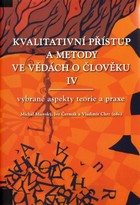
KONOPÁSEK, Z. (2005): Co znamená interpretovat text? In: M. Miovský, I. Čermák & V. Chrz, eds.: Kvalitativní přístup a metody ve vědách o člověku - IV: Vybrané aspekty teorie a praxe. Olomouc: FF UP. Str. 85-95
::::Jak analyticky vyložit text sebraných dat? Běžně se interpretace chápe jako myšlenkový postup. Snažíme se něco pojmově zpracovat; nově nahlédnout a uchopit. Takhle uvažují třeba filozofové a metodologové. Ve svém příspěvku půjdu jinudy. Ukážu interpretaci ne tolik jako mentální procesy (čtení), ale spíš jako pozorovatelné a vykazatelné materiální praktiky (psaní). Předvedu například, že co bereme jako „nové čtení textu“, se ve skutečnosti odehrává jako „čtení nových a nových textů“ – textů, které vytváříme analytickou prací s kvalitativními daty. Umění vyložit text vypadá z tohoto opomíjeného pohledu možná méně vznešeně než v metodologických pojednáních, ale o to přístupněji, použitelněji a obhajitelněji.
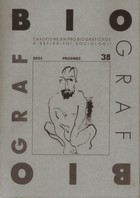
KONOPÁSEK, Z. (2005): Nesnáze s etnometodologií. Biograf , (38): 85-109
, (38): 85-109
::::
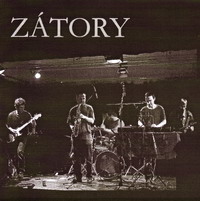
Zátory (2004): Dubeček - Domáč. CD. Vydáno vlastním nákladem
::::
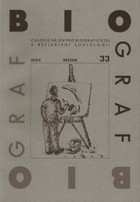
PREDA, A. (2004): Finanční vědění, dokumenty a struktury finančních činností. Biograf , (33): 3-29 - přeložili Zdeněk Konopásek a Jiřina Zachová
, (33): 3-29 - přeložili Zdeněk Konopásek a Jiřina Zachová
::::Starting from participant observation and interviews conducted in several European banks, the article examines how financial knowledge is constituted in the process of producing documents like research reports, analyses, and newsletters. The core argument is that documents act as organizational devices, with the help of which relationships are created, maintained, and managed across various contexts. In this perspective, the production of financial reports, analyses, and newsletters creates (1) knowledge-based networks of social relationships in which financial action is embedded and (2) stable temporal structures, thus ensuring the continuity of financial activities. On these grounds, the author argues here that knowledge-generating processes should be taken into account as an essential dimension of the structural embeddedness of financial action.
Přeloženo z originálu PREDA, A. (2002): Financial knowledge, documents, and the structures of financial activities. Journal of Contemporary Ethnography, 31 (4): 207-239
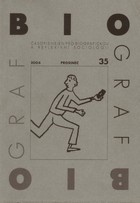
GUILLEMIN, M. / GILLAM, L. (2004): Etika, reflexivita a "eticky důležité okamžiky" ve výzkumu. Biograf , (35): 11-31 - přeložili Zdeněk Konopásek a Jiřina Zachová
, (35): 11-31 - přeložili Zdeněk Konopásek a Jiřina Zachová
::::Ethical tensions are part of the everyday practice of doing research—all kinds of research. How do researchers deal with ethical problems that arise in the practice of their research, and are there conceptual frameworks that they can draw on to assist them? This article examines the relationship between reflexivity and research ethics. It focuses on what constitutes ethical research practice in qualitative research and how researchers achieve ethical research practice. As a framework for thinking through these issues, the authors distinguish two different dimensions of ethics in research, which they term procedural ethics and "ethics in practice". The relationship between them and the impact that each has on the actual doing of research are examined. The article then draws on the notion of reflexivity as a helpful way of understanding both the nature of ethics in qualitative research and how ethical practice in research can be achieved.
Přeloženo z originálu GUILLEMIN, M. / GILLAM, L. (2004): Ethics, reflexivity, and "ethically important moments" in research. Qualitative Inquiry, 10 (2): 261-280
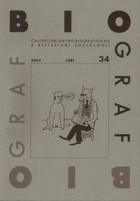
BERG, M. / BOWKER, G.C. (2004): Rozmanitá těla zdravotní dokumentace: K sociologii jednoho nástroje. Biograf , (34): 3-34 - přeložil Zdeněk Konopásek
, (34): 3-34 - přeložil Zdeněk Konopásek
::::This article argues that the medical record is an important focus for sociological research. In medical work, the modern patient´s body that Foucault has so aptly described is produced through embodied, materially heterogeneous work, and the medical record plays a crucial role in this production. It does not simply represent this body´s history and geography; it is a central element in the material rewriting of these. Simultaneously, the record fulfills a core role in the production of a body politic. As the record is involved in the performance of the patient´s body, it is also involved in the performance of the clinic in which that body comes to life. Finally, we argue that different records and different practices of reading and writing are intertwined with the production of different patient´s bodies, bodies politic, and bodies of knowledge. As organizational infrastructure, the medical record affords the interplay and coordination of divergent worlds. Seen as a site where multiple stories about patients and organizations are at stake, including the interoperability between these stories, the medical record becomes highly relevant both analytically and politically.
Přeloženo z originálu BERG, Marc / BOWKER, Geoffrey C. (1997): The multiple bodies of the medical record: Toward a sociology of an artifact. Sociological Quarterly, 38 (3): 513-537
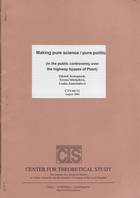
KONOPÁSEK, Z. / STÖCKELOVÁ, T. / ZAMYKALOVÁ, L. (2004): Making pure science / pure politics in the public controversy over the highway bypass of Plzeň CTS. Research Reports, CTS-04-12. Praha: CTS. Dostupné na adrese http://www.cts.cuni.cz/
::::Paper prepared for the Joint 4S & EASST Conference 2004 Public proofs – science, technology and democracy, Paris, Ecole des Mines, August 25-28 2004
This paper is based on a detailed empirical case study of a long-term public controversy over the construction of a highway bypass around the city of Plzen (in South-Western Bohemia, Czech Republic). The controversy involved a wide range of actors: local activists, an environmentalist NGO, politicians of all levels, experts, developers, state and regional administration, and media people. Two variants of the bypass were at stake: one of them gradually appearing better and better, attractive for experts, but existing as if only on paper, while the other was becoming more and more real, pushed through mainly by local politicians, and actually constructed. Although the story could be narrated in terms of an unequal struggle between environmentalists and small villages on one side and politicians, economic lobbies and municipality of a big city on the other, we will try to follow a more subtle and complex story-line, which focuses upon different strategic usages of science and politics. Besides explaining how it happened that one of the variants “attracted” the winning properties (and “won”), we will also describe a “vicious” circle of a double purification of science and politics and show how it contributes to the fragility of both democracy and expertise.
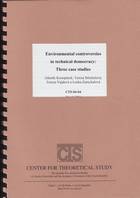
KONOPÁSEK, Z. / STÖCKELOVÁ, T. / VAJDOVÁ, T. / ZAMYKALOVÁ, L. (2004): Environmental controversies in technical democracy: Three case studies. CTS Research Reports, CTS-04-04. Praha: CTS. Dostupné na adrese http://www.cts.cuni.cz/
::::In this research report we present a collection of three case studies that have been undertaken within our work on the research project "Analysing public accountability procedures in contemporary European contexts". The overall aim of the project was to study opportunities and limits of democracy in societies in which expert knowledge becomes crucial for almost any decision-making and socio-technical networks that shape our daily lives are being openly and widely contested in the public arena. Especially in cases where science and technology are involved and where technicalities of different sorts and specialised knowledge penetrate political agenda, i.e., on the borderline of science and politics, the principles of open, friendly, inclusive and transparent politics (as well as the classical principles of disinterested and independent expertise) get into troubles. That is why we decided, in our research, to confront the principle of public accountability with the flesh-and-blood reality of the following socio-technical controversies, elaborated as in-depth case studies: (1) The controversy over the building and operation of the household waste incinerator in Praha-Malesice; (2) The public conflicts concerning the highway by-pass around the city of Plzeň; (3) Current policies and controversies related to the introduction of GMO into the Czech legal, social, economic and political environment.

RICHTER, P. (2003): Richtig music. 2CD. Indies Records [MAM-202]
::::"Dvoudiskový profil legendy české altenativní hudby, kytaristy, zpěváka a skladatele Pavla Richtera, mapuje celou jeho muzikantskou kariéru a obsahuje 23 nahrávek z let 1976-2003, přičemž při sestavování byl kladen důraz na zatím nikdy nezveřejněné nahrávky. Nejstarším záznamem je ukázka tvorby Elektrobusu, následují ukázky různých sestav skupiny Švehlík, resp. Marno Union (dvě koncertní nahrávky z roku 1978, dva domácí snímky z roku 1982, jedna skladba z alba obnoveného Švehlíku z roku 1995). Z poloviny 80. let pocházejí nahrávky s Oldřichem Janotou a sólová experimentální tvorba z Richterova domácího studia. První disk končí dvěma nahrávkami Richter Bandu z roku 1990 a jednou písní z dosud nepublikovaného záznamu obnovené sestavy Janota-Fidler-Richter z roku 1995. Mezi zúčastněnými hudebníky najdeme například Mikoláše Chadimu, Vlastimila Marka, Luboše Fidlera, Lesika Hajdovského, Ivana Pavlů, Zdeňka Konopáska či Jaroslava Kořána. Druhý disk zahrnuje odbdobí od roku 1996 a přináší ukázky z tvorby skupin Santus Musicus, Richter Band, Guru Band, Wooden Toys a nejnovější sólovou tvorbu Pavla Richtera. Mezi zúčasněnými hudebníky najdeme Bharatu Rajnoška, Janu Koubkovou či Antonína Hlávku. Z celkových 23 nahrávek je 18 publikováno poprvé, píseň V bílém (z alba Iva Bittová + Dunaj) dosud vyšla jen na gramofonové desce." (Indies)
[hudební ukázky zde]
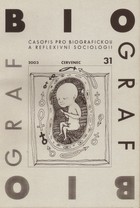
MOL, A. / LAW, J. (2003): Vtělené jednání, zjednávaná těla: příklad hypoglykémie. Biograf , (31): 5-25
, (31): 5-25
::::We all know that we have and are our bodies. But might it be possible to leave this common place? In the present article we try to do this by attending to the way we do our bodies. The site where we look for such action is that of handling the hypoglycaemias that sometimes happen to people with diabetes. In this site it appears that the body, active in measuring, feeling and countering hypoglycaemias is not a bounded whole: its boundaries leak. Bits and pieces of the outside get incorporated within the active body; while the centre of some bodily activities is beyond the skin. The body thus enacted is not self-evidently coherent either. There are tensions between the body's organs; between the control under which we put our bodies and the erratic character of their behaviour; and between the various needs and desires single bodies somehow try to combine. Thus to say that a body is a whole, or so we conclude, skips over a lot of work. One does not hang together as a matter of course: keeping oneself together is something the embodied person needs to do. The person who fails to do so dies.
MOL, A. / LAW, J. (2004): Embodied action, enacted bodies: The example of hypoglycaemia. Body & Society, 10 (2-3): 43-62












